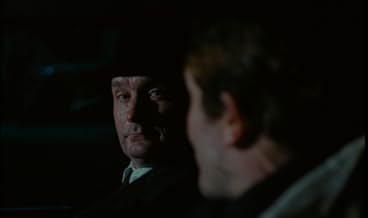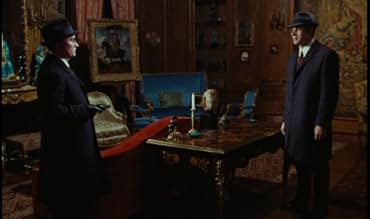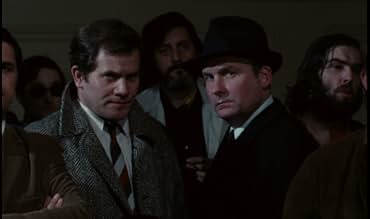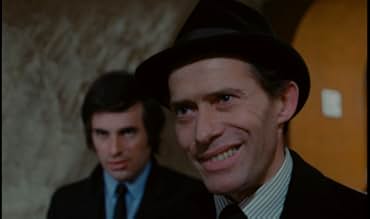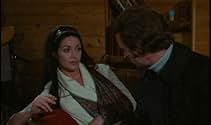While investigating a drug case, an inspector is shot dead by a gangster. His colleague, Inspector Favenin, is assigned to solve this crime. He is ready to do anything to save his colleague'... Read allWhile investigating a drug case, an inspector is shot dead by a gangster. His colleague, Inspector Favenin, is assigned to solve this crime. He is ready to do anything to save his colleague's honor, even if it means going beyond the law.While investigating a drug case, an inspector is shot dead by a gangster. His colleague, Inspector Favenin, is assigned to solve this crime. He is ready to do anything to save his colleague's honor, even if it means going beyond the law.
Gianni Garko
- Dan Rover
- (as John Garko)
Anne Carrère
- Christine
- (as Anne Carrere)
Théo Sarapo
- Lupo
- (as Theo Sarapo)
Jean-Claude Bercq
- Germain
- (as Jean-Claude Berck)
Stéphan Holmes
- Le jeune garçon
- (as Stephan Holmes)
6.8781
1
2
3
4
5
6
7
8
9
10
Featured reviews
French Dirty Harry
Yves Boisset's "Un condé" (from the French slang for cop) is a sort of Gallic "Dirty Harry", a police thriller that raises awkward questions about how far across the line the good guys can step in order to clear up society's mess. Inspector Favenin (Michel Bouquet) undoubtedly goes too far. When his idealistic but ineffectual partner is killed pursuing the culprits of a gang revenge attack (a pursuit instigated by Favenin himself), the embittered cop, realising that conventional police methods won't work, takes matters into his own hands.
At first, it's hard to resist cheering as he takes on the worst of the gang thugs using their own methods. But when his ruthless pursuit for revenge starts to impinge on the more sympathetic characters in the story, including an essentially decent man who gets beaten up in front of his young son, we are forced to question where our sympathies lie.
Boisset's functional, low-key direction, while lacking the stylistic flamboyance of Melville, serves the story well, and makes the frequent outbursts of violence all the more shocking. Bouquet is well-cast as the soft-spoken, solitary, buttoned-up and near-psychopathic Favenin, a more complex (and scarier because unpredictable) character than Eastwood's Harry Callahan. Whereas in "Dirty Harry" the hero's methods are questionable but his goals are morally correct, Favenin clearly has more personal motives that are not necessarily consistent with the public good. Even so, his pragmatic boss is willing to overlook his actions provided they can be covered up.
In a minor role, Michel Constantin, a stalwart of many French gangster movies, gives one of his best performances here as a fatalistic hired gun; his confrontation with Favenin is a highlight of the film.
At first, it's hard to resist cheering as he takes on the worst of the gang thugs using their own methods. But when his ruthless pursuit for revenge starts to impinge on the more sympathetic characters in the story, including an essentially decent man who gets beaten up in front of his young son, we are forced to question where our sympathies lie.
Boisset's functional, low-key direction, while lacking the stylistic flamboyance of Melville, serves the story well, and makes the frequent outbursts of violence all the more shocking. Bouquet is well-cast as the soft-spoken, solitary, buttoned-up and near-psychopathic Favenin, a more complex (and scarier because unpredictable) character than Eastwood's Harry Callahan. Whereas in "Dirty Harry" the hero's methods are questionable but his goals are morally correct, Favenin clearly has more personal motives that are not necessarily consistent with the public good. Even so, his pragmatic boss is willing to overlook his actions provided they can be covered up.
In a minor role, Michel Constantin, a stalwart of many French gangster movies, gives one of his best performances here as a fatalistic hired gun; his confrontation with Favenin is a highlight of the film.
Excellent!
Yves Boisset is a very special director, he has made many good films, most importantly, in my opinion, "The Assassination" (1972), with the great Gian Maria Volontè and many other exceptional actors, and "Dog Day"(1984) , with the unparalleled Lee Marvin. In "The Assassination", as a corrupt lawyer, we find the extraordinary Michel Bouquet, who here, in "The Cop", he is the cop, a policeman like you have not seen in other movies, a cop with an original philosophy, kindred somehow, with Clint Eastwood's Dirty Harry. But different! Michel Bouquet is an actor who does not need too many specific means or too many replicas to create memorable characters, Michel Bouquet is an absolute force, only by the way he looks, moves and breathes. Likewise, but in another register, it is Michel Constantin, who also plays a smaller role, but, as usual, natural, impeccable. Françoise Fabian is beautiful and natural. Probably the best part of Gianni Garko. So, Bernard Fresson. Adolfo Celi, a small role too but, as usual, very effective. Rufus, Théo Sarapo, Henri Garcin, Pierre Massimi, the same, very good. Need absolutely to be seen!
film noir and dark politics
Yves Boisset is not one of the famous French directors, which amplifies for me the (pleasant) surprise of watching his 1970 film 'Un condé' ('The Cop'). The director, who had been Jean-Pierre Melville's assistant, among others, demonstrates here that he not only learned many of the secrets of the trade from his master, but also that he had the courage to combine the genre of film noir (a tradition in French movies) with political cinema. The result makes of 'Un condé' both violent entertainment in the genre of the movies in which the cops are only a little less evil than the gangsters they face, and a political film in which a crisp message and characters immersed in moral corruption. In perfect synchronicity with what was happening at the same time in American cinema, 'Un condé' brings to the screen a vigilante hero with whom, as spectators, we identify for a while, until the moment the violence accumulates and we begin to question whether justice achieved through such illegal means remains justice, even in situations where there seems to be no alternative to the use of violence.
I liked the way this story is told. It starts with a settlement of accounts in the underworld between a gang of mobsters who do not hesitate to use any kind of violence to achieve their goals and the owner of a place who refuses to give up and pays with his life. When his sister and his best friend decide to take revenge, we, as spectators, cannot help but empathize with their feelings. A pair of policemen who seem incorruptible and who, because they are honest, are marginalized in a system that prefers to reach a 'modus vivendi' with criminals, comes into action. When one of them is killed by the same gang of mobsters, revenge seems justified, and again, as spectators, we are involved. The problem is that the world described in the film does not know clean methods to achieve its goals. Revenge means homicide, and police use Gestapo-like methods of interrogation. Made in 1970, 'Un condé' contains a strong post-1968 message of protest against police violence, which Yves Boisset will continue in his future films.
Made during the heyday of the 'film noir' genre in French cinema, a genre that had absorbed some of the talents of the New Wave, 'Un condé' is not inferior to many of the best-known achievements of the genre. The clear and intelligent script, the consistent visual conception and the fact that the characters are not morally judged for what they do contribute to this. They are committing atrocities for noble causes: friendship, fighting crime, opposing police corruption. If there is a culprit, this is the system that does not leave them too many alternatives. Michel Bouquet creates one of the best roles of his career and Michel Constantin adds another role to the ones that made him a favorite actor in gangster movies over several decades. I recommend the film, which in my opinion falls into the category of cinematic jewels that need to be rediscovered.
I liked the way this story is told. It starts with a settlement of accounts in the underworld between a gang of mobsters who do not hesitate to use any kind of violence to achieve their goals and the owner of a place who refuses to give up and pays with his life. When his sister and his best friend decide to take revenge, we, as spectators, cannot help but empathize with their feelings. A pair of policemen who seem incorruptible and who, because they are honest, are marginalized in a system that prefers to reach a 'modus vivendi' with criminals, comes into action. When one of them is killed by the same gang of mobsters, revenge seems justified, and again, as spectators, we are involved. The problem is that the world described in the film does not know clean methods to achieve its goals. Revenge means homicide, and police use Gestapo-like methods of interrogation. Made in 1970, 'Un condé' contains a strong post-1968 message of protest against police violence, which Yves Boisset will continue in his future films.
Made during the heyday of the 'film noir' genre in French cinema, a genre that had absorbed some of the talents of the New Wave, 'Un condé' is not inferior to many of the best-known achievements of the genre. The clear and intelligent script, the consistent visual conception and the fact that the characters are not morally judged for what they do contribute to this. They are committing atrocities for noble causes: friendship, fighting crime, opposing police corruption. If there is a culprit, this is the system that does not leave them too many alternatives. Michel Bouquet creates one of the best roles of his career and Michel Constantin adds another role to the ones that made him a favorite actor in gangster movies over several decades. I recommend the film, which in my opinion falls into the category of cinematic jewels that need to be rediscovered.
Superior police flick, Bouquet performance
Yves Boisset directs "Un Condé" with remarkable succintness and efficiency. To that end he is greatly assisted by Michel Bouquet's deadpan, top drawer performance, who in turn is well supported by Bernard Fresson, Adolfo Celi, Gianni Garko and the beautiful Françoise Fabian.
Inspector Favenin's character is built layer by layer and Bouquet emerges very convincingly as a copper doubling up as vigilante. The script is very good, with sharp dialogue, including copper talk in French. It would appear that this film provided some inspiration for DIRTY HARRY the following year and DEATH WISH in 1974.
Very competent and economical cinematography, reminiscent of Don Siegel's straightforward punches pulled approach to action.
I strongly recommend this film to anyone interested in film noir and in the French cinema.
Inspector Favenin's character is built layer by layer and Bouquet emerges very convincingly as a copper doubling up as vigilante. The script is very good, with sharp dialogue, including copper talk in French. It would appear that this film provided some inspiration for DIRTY HARRY the following year and DEATH WISH in 1974.
Very competent and economical cinematography, reminiscent of Don Siegel's straightforward punches pulled approach to action.
I strongly recommend this film to anyone interested in film noir and in the French cinema.
a murder
The basic motif to see it remains the admirable job of Michel Bouquet. A film about friendship, duty and corruption , simple, precise and using cold tones.
A cop is killed.
His colegue looks for the murderer, using all tools for find him.
Nothing new but seductive for the cinematography and for the wise way to use American model, giving to it profound nuances.
A film about guilty, to.
Interesting for the exploration of characters.
A cop is killed.
His colegue looks for the murderer, using all tools for find him.
Nothing new but seductive for the cinematography and for the wise way to use American model, giving to it profound nuances.
A film about guilty, to.
Interesting for the exploration of characters.
Did you know
- TriviaAlthough his film is close to Pierre Lesou's novel, director Yves Boisset confessed that, during the scene between Michel Constantin and Michel Bouquet, he was influenced by Jean-Pierre Melville's films' atmosphere and dialogue.
- Alternate versionsDue to pressure from then French Minister of the Interior Raymond Marcellin, the film had a tough time getting approved for release and director Yves Boisset was finally forced to cut a few lines of dialogue and reshoot the interrogation scene. The film was shown uncut and with the original scene internationally. In France, the original scene can be seen as a bonus feature on home video.
- ConnectionsReferenced in Parole de cinéaste: Yves Boisset: le cinéaste le plus censuré de France (2013)
Details
- Release date
- Countries of origin
- Languages
- Also known as
- Murder-Go-Round
- Filming locations
- Fourges, Vexin-sur-Epte, Eure, France(ending scene at the water mill)
- Production companies
- See more company credits at IMDbPro
- Runtime
- 1h 35m(95 min)
- Sound mix
- Aspect ratio
- 1.66 : 1
Contribute to this page
Suggest an edit or add missing content

